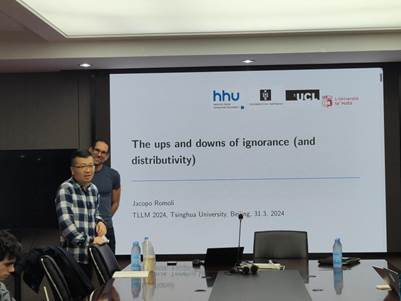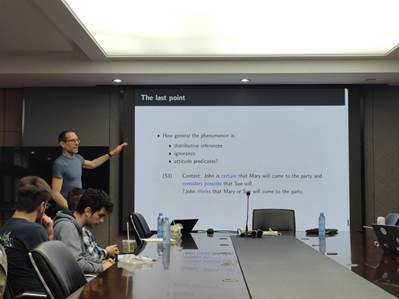On the afternoon of April 2, the 58th Zijin Lecture was held successfully at Room 201 of East Building 5, by the School of International Studies, Zhejiang University. The lecture, entitled ”The Ups and Downs of Ignorance (and Distributivity)”, was delivered by Jacopo Romoli, professor of Semantics and Pragmatics, University of Düsseldorf, Germany and moderated by Prof. ZHOU Peng from School of International Studies, Zhejiang University.

Prof. Romoli discussed the traditional theoretical analyses of the two types of extra-linguistic meanings elicited by “or” in English, namely the ignorance inferences and distributed statistical inferences. The traditional analysis proposes that the ignorance inferences generated by “or” in simple sentences consist of two parts, namely probabilistic inference and uncertainty inference, where the probabilistic inference corresponds to the lower bound and the uncertainty inference to the upper bound. When it is embedded within the scope of the modal verb “must”, “or” generates distributed statistics inference, which also consist of two parts, i.e., negative holomorphic inferences and distributed statistics inference, where the negative holomorphic inferences are upper bound, the distributed statistics inferences lower bound. Traditional analysis holds that the probabilistic inference relies on the uncertainty inference, while the distributed statistics inferences rely on the negative holomorphic inferences.
Furthermore, Prof. Romoli demonstrated how traditional theoretical analyses could be tested through experimental methods. He pointed out that the following experimental hypotheses could be formulated according to traditional theory: since the probabilistic inferences are based on the uncertainty inference, it is impossible to derive the probabilistic inferences without the uncertainty inferences; similarly, as the distributed statistical inferences are based on the universal negative inferences, it is impossible to derive the distributed statistical inferences without the universal negative inferences. Prof. Romoli then presented two experimental studies conducted by their research team to test these hypotheses. The studies revealed that in situations where uncertainty inferences are not generated, native English speakers still make probabilistic inferences; likewise, in situations where universal negative inferences are not elicited, native English speakers still make distributed statistical inferences. These experimental findings do not support the hypotheses derived from traditional theory.
In the end, Prof. Romoli discussed how to evaluate traditional theoretical analysis based on experimental results, how to revise existing theories based on the results, and even how to propose completely new theories. Prof. Romoli's lecture fully demonstrated the two-way interaction between theoretical and experimental research in linguistics, and provided a good inspiration for interdisciplinary research in linguistics. In the Q&A session, participants further discussed in-depth about his theoretical model, experimental design and challenges of experiments. Prof. ZHOU Peng gave a brief summary of the lecture, which came to a successful end in the enthusiastic and warm exchanges between students and teachers.

Photos: LI Yurong
Text: LI Xinzhu
Revised by: ZHOU Peng
Zijin Club
April 2, 2024
Translated by TIAN Ran, Proofread by XU Xueying



